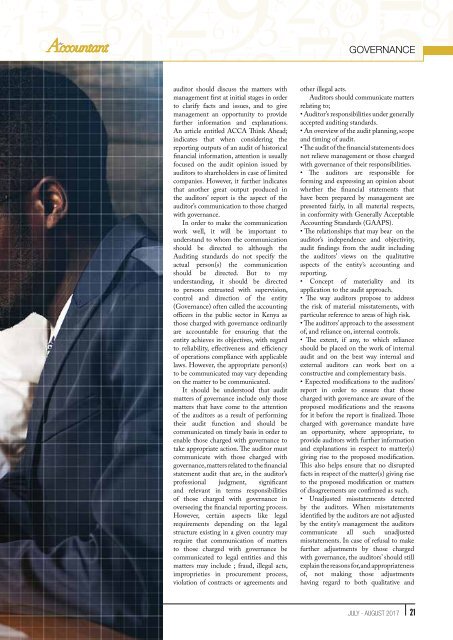The-Accountant-Jul-Aug-2017
Create successful ePaper yourself
Turn your PDF publications into a flip-book with our unique Google optimized e-Paper software.
Governance<br />
auditor should discuss the matters with<br />
management first at initial stages in order<br />
to clarify facts and issues, and to give<br />
management an opportunity to provide<br />
further information and explanations.<br />
An article entitled ACCA Think Ahead;<br />
indicates that when considering the<br />
reporting outputs of an audit of historical<br />
financial information, attention is usually<br />
focused on the audit opinion issued by<br />
auditors to shareholders in case of limited<br />
companies. However, it further indicates<br />
that another great output produced in<br />
the auditors’ report is the aspect of the<br />
auditor’s communication to those charged<br />
with governance.<br />
In order to make the communication<br />
work well, it will be important to<br />
understand to whom the communication<br />
should be directed to although the<br />
Auditing standards do not specify the<br />
actual person(s) the communication<br />
should be directed. But to my<br />
understanding, it should be directed<br />
to persons entrusted with supervision,<br />
control and direction of the entity<br />
(Governance) often called the accounting<br />
officers in the public sector in Kenya as<br />
those charged with governance ordinarily<br />
are accountable for ensuring that the<br />
entity achieves its objectives, with regard<br />
to reliability, effectiveness and efficiency<br />
of operations compliance with applicable<br />
laws. However, the appropriate person(s)<br />
to be communicated may vary depending<br />
on the matter to be communicated.<br />
It should be understood that audit<br />
matters of governance include only those<br />
matters that have come to the attention<br />
of the auditors as a result of performing<br />
their audit function and should be<br />
communicated on timely basis in order to<br />
enable those charged with governance to<br />
take appropriate action. <strong>The</strong> auditor must<br />
communicate with those charged with<br />
governance, matters related to the financial<br />
statement audit that are, in the auditor’s<br />
professional judgment, significant<br />
and relevant in terms responsibilities<br />
of those charged with governance in<br />
overseeing the financial reporting process.<br />
However, certain aspects like legal<br />
requirements depending on the legal<br />
structure existing in a given country may<br />
require that communication of matters<br />
to those charged with governance be<br />
communicated to legal entities and this<br />
matters may include ; fraud, illegal acts,<br />
improprieties in procurement process,<br />
violation of contracts or agreements and<br />
other illegal acts.<br />
Auditors should communicate matters<br />
relating to;<br />
• Auditor’s responsibilities under generally<br />
accepted auditing standards.<br />
• An overview of the audit planning, scope<br />
and timing of audit.<br />
• <strong>The</strong> audit of the financial statements does<br />
not relieve management or those charged<br />
with governance of their responsibilities.<br />
• <strong>The</strong> auditors are responsible for<br />
forming and expressing an opinion about<br />
whether the financial statements that<br />
have been prepared by management are<br />
presented fairly, in all material respects,<br />
in conformity with Generally Acceptable<br />
Accounting Standards (GAAPS).<br />
• <strong>The</strong> relationships that may bear on the<br />
auditor’s independence and objectivity,<br />
audit findings from the audit including<br />
the auditors’ views on the qualitative<br />
aspects of the entity’s accounting and<br />
reporting.<br />
• Concept of materiality and its<br />
application to the audit approach.<br />
• <strong>The</strong> way auditors propose to address<br />
the risk of material misstatements, with<br />
particular reference to areas of high risk.<br />
• <strong>The</strong> auditors’ approach to the assessment<br />
of, and reliance on, internal controls.<br />
• <strong>The</strong> extent, if any, to which reliance<br />
should be placed on the work of internal<br />
audit and on the best way internal and<br />
external auditors can work best on a<br />
constructive and complementary basis.<br />
• Expected modifications to the auditors’<br />
report in order to ensure that those<br />
charged with governance are aware of the<br />
proposed modifications and the reasons<br />
for it before the report is finalized. Those<br />
charged with governance mandate have<br />
an opportunity, where appropriate, to<br />
provide auditors with further information<br />
and explanations in respect to matter(s)<br />
giving rise to the proposed modification.<br />
This also helps ensure that no disrupted<br />
facts in respect of the matter(s) giving rise<br />
to the proposed modification or matters<br />
of disagreements are confirmed as such.<br />
• Unadjusted misstatements detected<br />
by the auditors. When misstatements<br />
identified by the auditors are not adjusted<br />
by the entity’s management the auditors<br />
communicate all such unadjusted<br />
misstatements. In case of refusal to make<br />
further adjustments by those charged<br />
with governance, the auditors’ should still<br />
explain the reasons for, and appropriateness<br />
of, not making those adjustments<br />
having regard to both qualitative and<br />
JULY - AUGUST <strong>2017</strong> 21

















